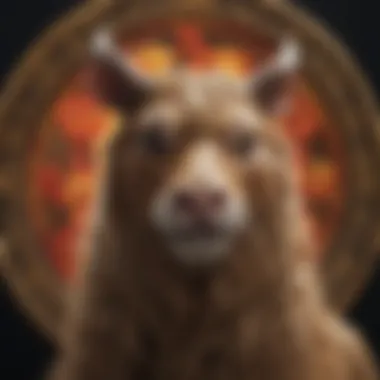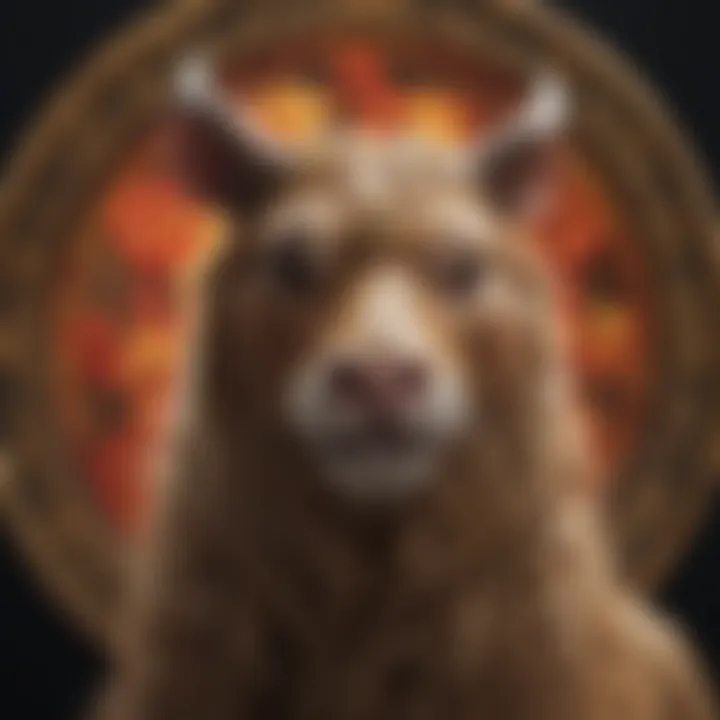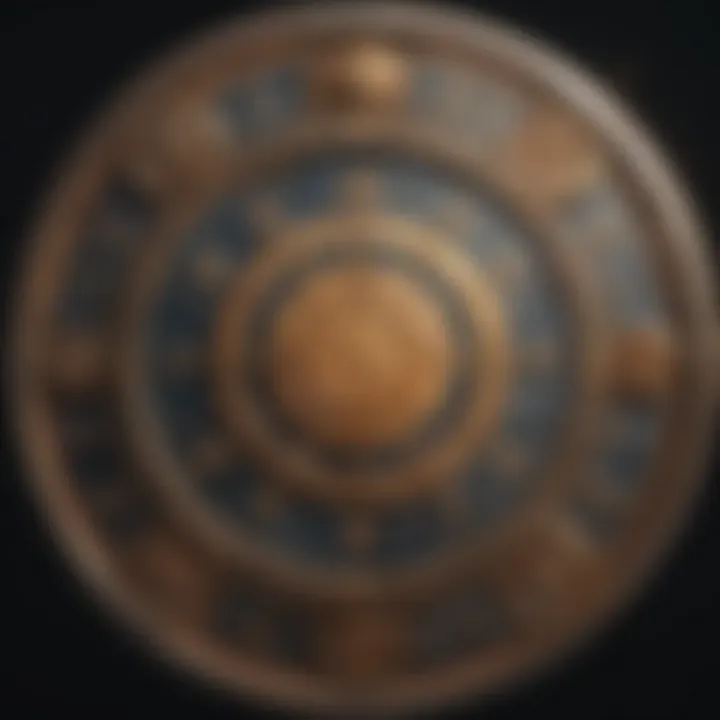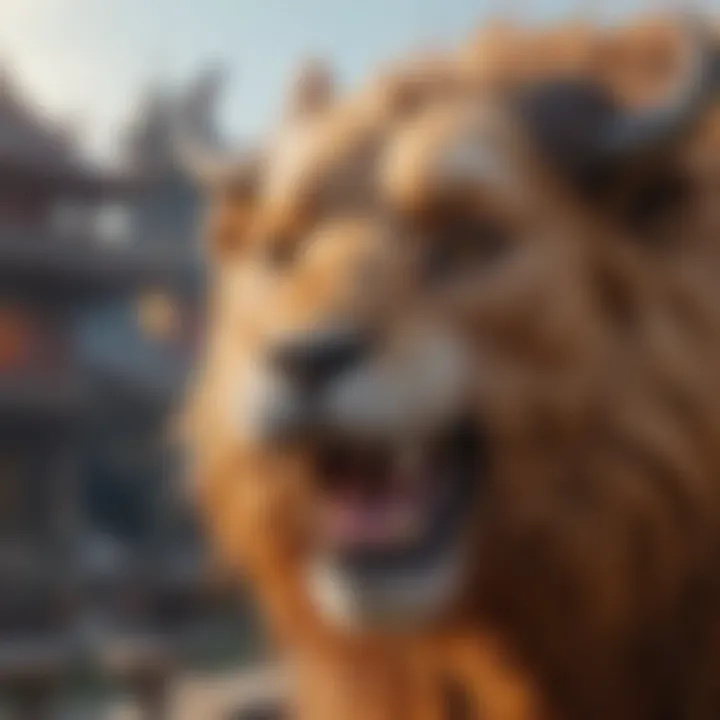Understanding Chinese Astronomical Signs and Their Impact


Intro
Chinese astronomy and astrology are both fascinating subjects that intertwine history, culture, and the cosmos. Rooted in thousands of years of tradition, they offer more than just a way to foretell personal destinies. Instead, they present a unique lens through which we can view our relationships, personality traits, and even workplace dynamics. This article aims at dissecting Chinese astronomical signs, giving both newcomers and seasoned astrology enthusiasts insights into their profound implications.
Notably distinct from their Western counterparts, Chinese zodiac signs are influenced not only by the celestial positions of planets and stars but also by a variety of philosophical beliefs and cultural practices. This complexity lays the groundwork for a rich and multifaceted exploration.
By focusing on the unique profiles of each sign, delving into the compatibility between them, analyzing the impact of astrological events, and showcasing how all this encapsulates everyday life, we endeavor to impart an understanding that resonates deeply.
Zodiac Profiles
Overview of Each Sign
The Chinese zodiac comprises twelve distinct signs, each corresponding to a specific year in a 12-year cycle. This cycle is marked by a rat, ox, tiger, rabbit, dragon, snake, horse, goat, monkey, rooster, dog, and pig. Each sign embodies particular characteristics and philosophical ideas, shaping the lives of those born under their influence.
Personality Traits
Each sign carries with it a set of well-defined personality traits that can guide individuals in their personal journeys. For example:
- Rat: Intelligent and quick-witted, those born in the Year of the Rat often demonstrate adaptability and resourcefulness.
- Ox: Known for being diligent and dependable, the Ox symbolizes hard work and persistence.
- Tiger: Courageous and ambitious, Tigers seek out challenges and adventure.
Strengths and Weaknesses
While each sign has its strengths, they also have inherent weaknesses.
- Rat: Can be overly secretive.
- Ox: Stubbornness sometimes limits growth.
- Tiger: Impulsiveness can lead to reckless decisions.
This duality of attributes contributes to a richer understanding of oneself and others, informing personal relationships and interactions in daily life.
Compatibility Insights
Love and Relationships
Astrological compatibility in the Chinese zodiac is a nuanced affair. The harmony or discord between different signs can significantly shape romantic relationships. For instance, the Ox and Rooster often resonate well together, sharing similar values which foster commitment. On the other hand, the Tiger may find challenges with the Monkey, as their energies can clash.
Friendship Compatibility
Friendships can thrive or falter based on astrological signs as well. Certain combinations, like the Snake and the Rooster, tend to form strong bonds due to their mutual appreciation for loyalty and integrity.
Workplace Dynamics
In a professional context, understanding zodiac compatibility can enhance team dynamics. For instance, Dogs often work harmoniously with Tigers, as both are driven and goal-oriented, yet the protective nature of the Dog can support the boldness of the Tiger.
Astrological Events
Monthly/Weekly Horoscope Breakdown
Chinese astrology not only encodes personal traits but also considers the effects of time. Tracking monthly or weekly horoscopes can provide insights into timing for decisions, helping navigate life’s hurdles with precision.
Notable Celestial Events
Awareness of key celestial events, such as eclipses or planetary alignments, adds another layer. For instance, during a lunar eclipse, those under a Rat sign might find themselves reflecting on their past achievements and future goals, creating opportunities for transformation.
How to Prepare for Astrological Shifts
Preparation can mean different things based on one’s sign. Some might find settling into routine during challenges helps, while others may need to embrace change with open arms. Understanding these shifts can impact everything from daily stress levels to long-term planning.
"Each sign is a canvas, painting formidable stories of personality, compatibility, and life’s journey."
In bridging the ancient practices of Chinese astrology with modern pursuits, this guide aims to equip readers with a fresh perspective, stimulating thoughts on how the cosmos intertwines with personal destiny.
Prelude to Chinese Astronomical Signs
Chinese astronomical signs hold a unique place in the tapestry of human understanding regarding the cosmos. These signs, rooted in a millennia-old tradition, offer more than just an astrological forecast. They encapsulate cultural beliefs, philosophy, and an enduring connection between the heavens and daily life.
Understanding the fundamental aspects of Chinese astronomical signs can significantly enhance one's perspective on both astrology and life itself. This exploration isn’t just about identifying one’s zodiac sign; it’s about recognizing how these signs influence personalities and relationships, providing a framework for interpreting various social dynamics.


The significance of these signs can be attributed to several key elements:
- Cultural Relevance: The Chinese zodiac goes beyond mere superstition. It impacts celebrations, festivals, and societal norms throughout the Chinese-speaking world. With the onset of the Lunar New Year, these signs become central to the festivities, influencing familial interactions and community gatherings.
- Philosophical Underpinnings: Each sign is intertwined with ancient philosophical thoughts, particularly Taoism and Confucianism, which dictate not just personal attributes but also moral implications and life choices. This deep interconnection adds layers to understanding oneself and others.
- Practical Applications: The insights derived from knowing one's sign can guide individuals through life’s challenges. By understanding traits associated with their zodiac sign, many people find comfort and direction, serving as a tool for personal growth and decision-making.
To fully appreciate the importance of Chinese astronomical signs, it’s essential to recognize them not only as astrological symbols but also as complex representations of a culture that engages with the universe in a distinct vein. Whether one is at the beginning of their astrological journey or looking to deepen their understanding, the exploration of these signs invites a richer appreciation of life’s myriad connections.
"Astrology is a way of turning the chaos of the universe into a language that can be spoken, understood, and embraced."
Historical Context
When delving into the realm of Chinese astronomical signs, understanding their historical context is not just an academic exercise; it’s integral to grasping how these celestial markers have shaped cultural beliefs and practices over millennia. The significance of historical context lies in its ability to illuminate the evolution and transformation of these signs, revealing their layered meanings and profound implications in society.
As one navigates the labyrinth of Chinese astrology, one quickly realizes that these signals do not exist in a vacuum. They are entwined with the philosophies and ideologies that have defined Chinese civilization. This section will elucidate key historical elements, covering how ancient practices were influenced by astronomical observations, the role of celestial events in governance, and broader cultural traditions that intertwined with these beliefs.
Origins of Chinese Astronomy
Chinese astronomy has roots that dig deep into antiquity, with the earliest records tracing back to the Shang Dynasty, around the 16th century BCE. This was a time when the observation of the night sky was not merely a scientific curiosity but also a potent tool for divination and decision-making. The ancient Chinese believed in the cosmos as a living entity that directly impacted earthly affairs.
Here are some key points regarding the origins:
- Celestial Records: The earliest astrological texts, like the "I Ching" and the "Book of Changes," laid the groundwork for future interpretations and astrological applications.
- Observation Practices: Ancient astronomers meticulously noted phenomena such as eclipses and supernovae, often associating these events with foretelling disasters or blessings for the emperor and the state.
- Integration with Philosophy: The philosophical tenets of Confucianism and Daoism intertwined with astronomical theories, enriching their significance. This fusion not only affected individual lives but also served as guidance for rulers to maintain harmony in society.
The rich tapestry of historical developments shaped the foundation of what we now recognize as Chinese astrology.
The Influence of Ancient Civilizations
The tapestry of Chinese astrology and astronomy was not woven in isolation. It was significantly shaped by interactions with neighboring civilizations, notably through trade routes like the Silk Road and diplomatic exchanges. These connections fostered an exchange of ideas and practices, enriching the already complex beliefs of the Chinese.
- Buddhism and Hinduism: The advent of Buddhism from India brought with it a trove of astronomical and astrological ideas that intermingled with existing Chinese concepts.
- Persian Contributions: Influences from Persian astronomy further added layers to the interpretations of celestial bodies, introducing concepts such as fixed stars and planetary movements.
- Syncretism in Practices: The merging of various ancient systems resulted in a unique synthesis, which not only adapted existing knowledge but also transformed it into something distinctly Chinese.
"Every twinkling star became a reflective mirror of human life and destiny, guiding not just paths but shaping entire societies."
Fundamentals of Chinese Astrology
Understanding the Fundamentals of Chinese Astrology is essential for anyone looking to grasp the nuances of this ancient practice. Unlike the more familiar Western astrology, which tends to revolve around the sun signs and personal traits associated with them, Chinese astrology employs a vastly more complex schema, exhibiting layers of depth involving elements, yin and yang, and even the lunar calendar. These components create a rich tapestry that speaks to one's personality, potential, and interactions with others.
At its core, Chinese astrology is centered around the twelve zodiac signs, which are intrinsically linked to a cycle that encompasses not just the character traits of individuals but also how they relate to the world around them. One of the notable benefits of diving into this field is allowing individuals to gain clarity about their paths in life. More so, understanding the principles behind this astrology can aid in the pursuit of personal growth, offering insights that may help one navigate both professional and personal challenges with a lot more finesse.
Moreover, the interpretations in this astrological system offer broad insights into one's strengths and weaknesses. Deciphering these threads of connection can be quite beneficial for those aiming to harmonize their relationships, whether in a platonic, familial, or romantic realm.
Underlying Principles
The Underlying Principles of Chinese astrology are rooted in the belief that celestial bodies influence earthly events and individual dispositions. Central to this framework is the concept of Five Elements: Wood, Fire, Earth, Metal, and Water. Each element corresponds not just to the zodiac signs but also to specific characteristics and traits that people might embody. For example, Fire is associated with passion, enthusiasm, and dynamism, while Water is more reflective and resourceful.
Plus, the interplay between the Yin and Yang provides a balanced perspective, highlighting that each sign embodies both aspects, which promotes harmony. Every sign represents a unique blend of these qualities, playing a pivotal role in the astrological narrative. The natural cycles of the universe, as governed by the lunar calendar, also contribute significantly to individual destinies and fortunes, further enriching the interpretation landscape.
Contrast with Western Astrology
The Contrast with Western Astrology is quite profound. While Western systems often focus on the alignment of planets and their influence based on a specific date of birth, Chinese astrology places greater emphasis on annual cycles, aligning each zodiac sign with a specific year, rather than merely a month or day. This implies that while a person's sun sign may be fixed, their broader astrological identity can be fluid depending on the year of their birth.
In terms of compatibility, the Western system typically emphasizes sun sign interactions, which can lead to oversimplifications. Conversely, Chinese astrology dives deeper into compatibility by analyzing not just the zodiac sign but also the elements and the inherent characteristics—encouraging a holistic view of relationships.
"While Western astrology often focuses on individual traits, Chinese astrology paints a more collective picture, weaving in complex relationships with time and elements."
In summary, mastering Fundamentals of Chinese Astrology opens a path for enriched understanding and practical applications in personal life. The interrelationships between signs, elements, and the cyclical nature of their influences illuminate not just personality traits but also pathways towards growth and success.
The Twelve Chinese Zodiac Signs
The Twelve Chinese Zodiac Signs form the backbone of Chinese astrology, serving not just as mere symbols, but as intricate representations of personality traits, behaviors, and potential life paths. Each sign corresponds not only to a year in the twelve-year cycle but also encapsulates a distinct essence that influences those born under its domain.
Understanding the characteristics attributed to these signs is essential for anyone delving into the nuances of Chinese astrology. This section not only depicts individual traits but also highlights how these signs interconnect, shaping interpersonal relationships and personal growth strategies. From the spirited Rat to the tranquil Pig, there’s a wealth of knowledge in examining what each sign brings to the table—an endeavor likely to resonate with astrology enthusiasts and those seeking holistic insights alike.
Rat
The Rat stands out as the first sign in the zodiac, embodying adaptability and intelligence. Those born under the Rat are often perceived as clever problem-solvers, able to navigate challenges with ease. Their social nature helps them build networks, making them adept at seizing opportunities. However, it is important to balance this ambition with humility, as their confidence might sometimes edge into arrogance.


Ox
The Ox symbolizes diligence and reliability. Individuals under this sign are known for their strong work ethic. They tend to be methodical in approach and appreciate stability in life. While they may seem reserved, Oxen often possess a deep well of emotions. Patience is their virtue, and those who bond with these individuals can expect steadfast loyalty in return.
Tiger
As the embodiment of bravery and competitiveness, the Tiger is characterized by its charismatic and authoritative nature. People born in the Year of the Tiger are often seen as natural leaders, driven by an adventurous spirit. However, their fierce independence can lead them to act impulsively. Maintaining balance between instinct and consideration is crucial for them.
Rabbit
The Rabbit is associated with gentleness and tact. Those bearing this sign are often diplomatic, preferring harmony over conflict. They value their social circles and tend to be good listeners. Their keen intuition helps them navigate complex social dynamics, often bringing people together. However, they must be cautious of becoming overly sensitive to criticism, which can affect their self-esteem.
Dragon
The Dragon is a symbol of power and vitality. Renowned for their dynamic personalities, individuals born in the Year of the Dragon are generally ambitious and enthusiastic. They stand out wherever they go, but their intimidating presence can sometimes alienate others. Embracing vulnerability without losing their fierce spirit could foster deeper connections.
Snake
The Snake brings a sense of mystery and wisdom. Those born under this sign are often deep thinkers and observers. They tread carefully in the world, preferring to consider all angles before making a move. This trait renders them strategic and resourceful, yet they are also prone to jealousy. Finding a balance between introspection and openness can enhance their relationships.
Horse
The Horse is characterized by energy and spirited enthusiasm. Individuals with this sign are typically warm, social, and friendly. They flourish in environments where they can express themselves and their freedom. However, their impulsiveness can lead to hasty decisions. Establishing a level of patience may help Horses to find more sustainable paths.
Goat
The Goat is known for its artistic flair and gentle demeanor. Those born in the Year of the Goat are often perceived as compassionate and wise, with a strong sense of community. They thrive in supportive environments, but their shy nature may hinder them from taking the initiative. Enhancing their confidence is essential for personal growth.
Monkey
The Monkey signifies cleverness and curiosity. Individuals under this sign often possess quick wit and a playful nature. While they are born entertainers, their penchant for mischief can sometimes lead to misunderstandings. It’s vital for Monkeys to channel their creativity positively, focusing their intelligence toward constructive outcomes.
Rooster
The Rooster is known for its confidence and punctuality. Those born under this sign are often direct in their communication and take great pride in their appearance. However, they may appear overly blunt at times. Striking the right balance between honesty and sensitivity can enhance their interactions with others.
Dog
The Dog epitomizes loyalty and honesty. Individuals of this sign are typically protective of their loved ones and have an unwavering sense of justice. Their natural empathy makes them great friends and confidantes. However, they need to guard against cynicism, which could disconnect them from their inner circle's joy and trust.
Pig
The Pig symbolizes generosity and kindness. People born under this sign are generally easygoing and tolerant. They appreciate life’s pleasures, often indulging in its finer aspects. However, they can be susceptible to being taken advantage of due to their trusting nature. Learning to recognize boundaries while maintaining their inherent warmth is crucial for them.
By unearthing the diverse attributes of these Zodiac signs, individuals can reflect on their traits and behaviors, empowering personal development and interpersonal rapport. Consequently, the insights gleaned from this exploration pave the way for a richer understanding of oneself and others within the vast tapestry of Chinese astrology.
Cultural Significance
The cultural signficance of Chinese astronomical signs goes beyond mere horoscope readings or fun personality assessments. It weaves itself into the fabric of Chinese society, influencing multiple lifestyle aspects—from family values to decision-making practices. Understanding these signs can provide insight into how people relate to each other and to their environments, and this extends far beyond the individual.
In many Asian cultures, the connection with nature is ever-present. The cyclical patterns of the lunar calendar resonate deeply with agricultural practices, festivities, and even personal milestones. This article seeks to unravel the layers of this influence, highlighting how these signs play a crucial role in navigating life's intricacies.
Festivals and Traditions
Festivals in Chinese culture often align closely with the zodiac calendar. Take, for example, the Lunar New Year. People prepare for this event with great care, focusing on various traditions that integrate their astrological beliefs. Each year associated with a specific animal means different things to individuals.
- Eating Specific Foods: Dishes like dumplings and fish symbolize prosperity and completeness. The context of food often merges with zodiac traits—dragons might be seen as inviting grandeur, while rabbits invite harmony.
- Rituals for Good Fortune: Many families perform rituals to ask for blessings specific to their zodiac sign. The belief is that these actions can tip the scales of fate in their favor for the new year.
- Decorating with Zodiac Representations: From lanterns to intricate paper cuts, art becomes a medium of celebration. Each zodiac sign can be represented, inviting luck and reflecting personal identities.
In essence, festivals offer collective moments where astrological connections shine bright. They harmonize communities as groups and families come together, grounding their cultural practices in a shared understanding of their celestial influences.
Mythology and Symbolism
Chinese astrology is steeped in rich mythology, imparting meanings that resonate on many levels. Each zodiac sign carries unique stories, symbolisms, and lessons. Here’s a peek into how they shape one’s understanding of the world:
- The Rat: Often viewed as clever, resourceful, and quick-thinking, the Rat embodies ingenuity. In mythology, it is sometimes portrayed as a trickster, illustrating the virtues and vices of human nature.
- The Dragon: The most auspicious sign, the Dragon symbolizes power and strength. Legends often depict this creature as a benevolent guardian, which can correlate to many personal aspirations.
- The Snake: Associated with wisdom and intuition, snakes in folklore are reminders of the need for patience and observation and are often considered mystical beings with deep foresight.


Through the lens of mythology, zodiac signs not only represent personality traits but also embody life lessons and moral teachings that persist through generations.
In sum, understanding the cultural significance of Chinese astronomical signs reveals much about values, relationships, and even ethics intrinsic to society. These signs guide the Chinese way of thinking, providing frameworks for interpreting human interactions and experiences. By exploring festivals and mythology surrounding these signs, one can see how deeply interwoven they are with daily practices and psychological mindsets.
Compatibility Among Signs
Compatibility among the Chinese zodiac signs serves as a significant cornerstone of understanding interpersonal relationships within Chinese astrology. The ancient practice emphasizes that celestial influences shape not just personal attributes but also the dynamics of relationships. Knowing which signs naturally align can lead to better relationships and personal harmony. People often seek this knowledge to enhance their social interactions and make informed choices in partnerships, whether in love, friendship, or business.
Furthermore, recognizing compatibility can also fine-tune expectations. Individuals may find comfort in their sign's natural affinities, helping them avoid mismatched partnerships that could lead to unnecessary conflict. Ultimately, this understanding enhances overall well-being and communication, making the impact of compatibility among signs palpable and tangible in everyday life.
Interpersonal Dynamics
Interpersonal dynamics hinge greatly on one’s zodiac sign, which reflects various traits and characteristics. Signs such as Rat and Dragon are often seen as highly compatible due to their outgoing nature and ambition. These correlations stem from the values and characteristics attributed to each sign. When two signs are in sync, qualities like trust and mutual respect flourish.
In contrast, signs that clash can lead to misunderstandings and friction. For instance, the meticulous nature of the Snake might lead to conflicts with the freewheeling mindset of the Horse. However, it’s not that opposites can’t attract; rather, understanding these dynamics allows individuals to approach relationships with a clearer perspective. Here are some common compatibilities:
- Rat and Dragon: Energy flows seamlessly, fostering vivacious companionship.
- Ox and Rooster: Shared commitment and determination lead to solid partnerships.
- Tiger and Horse: Shared adventurous spirits make for exhilarating connections.
- Snake and Monkey: Intellectually stimulating exchanges build a certain rapport.
Understanding these dynamics provides valuable insights that can be foundational for astrological interpretations.
Strategies for Harmonious Relationships
To cultivate harmonious relationships in light of zodiac compatibilities, individuals can adopt several strategies. Key considerations revolve around communication, appreciation, and compromise. Non-verbal cues often play a major role in the subtleties of interaction. Here are several practical strategies to nourish compatibility:
- Open Communication: Engage in conversations about astrological beliefs and how they influence perceptions. This transparency fosters understanding and removes barriers.
- Admiration and Respect: Acknowledge differences between signs with respect and recognition. Celebrating both shared qualities and contrasts can deepen mutual appreciation.
- Flexibility: Exercise patience and flexibility when encountering disagreements. Be open to compromise, especially when dynamics become tense.
- Shared Activities: Engage in activities that both partners enjoy. This creates opportunities for bonding and fortifies connections nurtured by shared interests.
In the realm of relationships, recognizing the stars can shine a light on potential issues and help individuals navigate the complexities of human interaction.
The bottom line is that while astrology provides valuable insights into compatibility, attentive efforts from both parties hold the ultimate key to maintaining harmonious relationships. Understanding the unique traits of each sign not only enhances interpersonal dynamics but also enriches the experience of connection.
Practical Applications of Chinese Astrology
Chinese astrology extends beyond mere predictions; it serves as a tool for personal insight and guidance. Many enthusiasts find value in navigating life's complexities through the lens of their zodiac signs. By employing these ancient principles, one can enhance their life decisions on several fronts, which can notably influence both individual and communal aspects of existence.
Personal Growth
Understanding one’s zodiac sign is like having a mirror held up to one’s soul. It reflects inherent personality traits and tendencies that shape behavior. For instance, someone born in the Year of the Snake is often seen as wise and cautious. By recognizing these traits, a person can focus on personal growth strategies that resonate with their astro-sign, fostering self-awareness and development. Some practical ways to leverage this knowledge include:
- Reflective Practices: Engage in meditation or journaling based on your sign's characteristics.
- Goal Setting: Tailor personal and professional goals to align with your sign's strengths and weaknesses. A Rooster, known for punctuality, might focus on organizing their schedule effectively, while a Tiger could embrace leadership roles.
"The cosmos speaks in whispers; to listen is to learn the art of being."
In addition, knowing one's elemental interaction can encourage interpersonal relationships. For instance, a person born under the Fire element can become aware of their fiery disposition, taking care not to overwhelm those whose elements are more tempered. Furthermore, certain activities and hobbies can be embraced more vigorously, having the propensity to bring out the best in one's character based on zodiac traits, creating a path toward fulfilling personal potential.
Career Guidance
Career development stands as a foundation for stability and growth, and here, Chinese astrology plays a significant role. The principles behind the zodiac offer insights into suitable professional paths. For example, a person born under the Ox sign, often regarded as diligent and reliable, may find fulfillment in careers involving perseverance, such as engineering or finance. The alignment of one's career choices with their astrological sign can lead to greater job satisfaction and productivity.
Consider these potential paths for various signs:
- Horse: Excels in dynamic fields like marketing or event planning.
- Monkey: Thrive in creative industries, such as advertising or design.
- Dog: Flourish in social sectors like healthcare or education.
Moreover, navigating workplace dynamics can also benefit from understanding astrological compatibility. Team projects, for instance, may prosper when a Pig, who often fosters harmony, collaborates with a Goat, known to be artistic and innovative. Recognizing these dynamics can lead to more effective team formations and management styles, ultimately supporting a balanced workplace culture.
By fostering an understanding of one’s strengths and possible challenges through the lens of their zodiac sign, a person can seek not just any career but one that resonates with their authentic self, promoting long-lasting satisfaction and a sense of fulfillment.
Epilogue
In wrapping up this exploration of Chinese astronomical signs, it's crucial to grasp the significance these symbols hold within the larger tapestry of life and culture in China. These signs are more than mere representations; they are living entities that intertwine with our daily decisions, personalities, and interactions.
Understanding Chinese astrology equips individuals with profound insights into their innate behaviors and tendencies, fostering self-awareness and growth. The underlying principles of this astrological system, rooted in centuries of philosophical wisdom, present a framework through which one can navigate complexities of life. The cyclical nature of the zodiac encourages a continual process of learning and adaptation, where each year brings new opportunities for reflection and improvement.
Additionally, the cultural depth embedded in these signs cannot be overlooked. They feature prominently in festivals and traditions, narrating stories that connect individuals to their ancestry and community. The festivals, such as the Chinese New Year, offer a time for individuals to recognize and embrace the attributes of their zodiac signs, thereby reinforcing their cultural identity and values.
"The magic of the zodiac is not just in its predictions, but in the stories we tell and the lives we lead based on them."
Thus, the compatibility between signs elucidates interpersonal dynamics, enabling individuals to forge better relationships and understand their place in the social fabric. Knowing how one’s sign interacts with others can pave the way for smoother communication and healthier bonds.
In practical applications, the insights derived from understanding one's Chinese zodiac sign can extend into realms of personal growth and career guidance. By utilizing astrological insights, individuals can make informed decisions that align with their strengths, thereby enhancing their quality of life.
To sum it up, the realm of Chinese astronomical signs serves as a profound guiding star in personal and communal contexts alike. Whether you’re a novice or a seasoned astrology enthusiast, navigating through the nuances of how these celestial influences play into daily life can certainly lead to more insightful living, making this exploration both enriching and indispensable.
Thus, engaging with these signs opens up a world of possibilities that resonate with human experience, history, and personal journeys. Embracing this knowledge not only enriches the understanding of oneself but also nurtures connections with others.
In a world often shrouded in complexities, the wisdom held within Chinese astrology shines bright, awaiting those ready to adopt it as a companion in their life’s journey.



